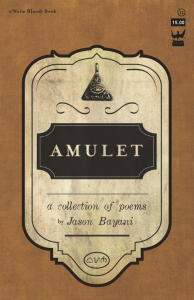Amulet by Jason Bayani | Write Bloody Publishing 2013 | $15.00

After a Jason Bayani poem, sometimes all you can say is, “Damn.” At 84 pages, Amulet may cause excessive cursing. And not just to God, but to other “thing[s] just out of reach” (45), all the hollering forged into an object that will protect us from harm. His hands both a curled fist and a prayer, Bayani waits . . . waits for this noise to take the shape of language.
Amulet‘s epigraph invokes Jose Garcia Villa and gestures toward the romantic brokenness and terrific terror of the poems to follow, which are birthed from a lineage of great Filipin@ American writers. I’m not one to go in for beauty in poetry, but damn, the way Bayani “remak[es] the line” (as he suggests in the opening poem to this collection) is beautiful. Consider the lines “Give me the petal that hits like a heavy brick” (35) or “My body is a projection of stone that remembers the mountain it ran away from” (76). Feel the tidal movement of the earth and of time in the line: “all this history in the open veil of your body, / this seed, this push, this silt, / how we been built by a blood procession of so many hands / pulling plough over poverty” (67). On the back cover, Barbara Jane Reyes says that “the language of Bayani’s poems pops and bangs, punches, hurls bricks, and then does not flinch from tenderness,” and I agree that there is a surprising vulnerability here that disarms as much as it reveals its own strength.
The weight of this book is in its silences, in the words “just out of reach,” as it contemplates the impact of silence among men of color when no one really teaches you “what to do with your hands” (75). The palms, then, and the mouth, become heavy weights. While Bayani knows that “A man’s ability to feel is overvalued in Art. / I’ve cashed in on it. / Every woman who loved me / hates me a little for that” (24), he also urges us to “Imagine we’re in a room, and everything in this room / has a mouth except for me. I feel that most days” (22). It is Bayani’s humor and grief made vulnerable, and the felt sense of the body “fall[ing] into a hard focus” (37), that makes us listen to the ringing in that place inside ourselves. Continue reading “Review: Jason Bayani’s AMULET”